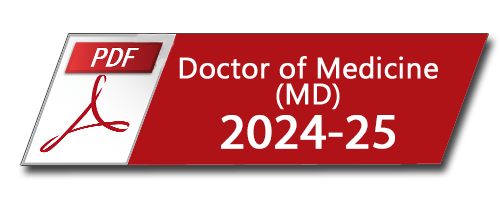Assessment Methodologies
MBBS program years I to V
Pre-Clerkship Courses of MBBS Years I & II
The curriculum for the Pre- Clerkship courses of first two years of MBBS program is an Integrated Modular Curriculum. The basic sciences courses are integrated into various modules and each module is considered equivalent to a course with credits
- Year 1 consists of 4 modules.
- Year 2 consists of 4 modules.
There is both Continuous Assessment and Comprehensive Examinations for each module. Both components are applied for assessment of theory and practical learning.
Continuous assessment is performed throughout the academic year and the Comprehensive Examination is conducted at the end of the academic year. Combination of the grades achieved by the students in these components gives the final grade that the students achieve at the end of each year. Progression along the module is decided at the end of each academic year.
Continuous assessment contributes 60% and Comprehensive Examination contributes 40% towards the final grades (Both for theory and practical) and these components have to be passed together. In case of failure in comprehensive examination, both theory and practical exams have to be repeated in repeat examination.
Continuous assessment exams are conducted by the basic sciences departments of RAKCOMS.
Continuous Assessment
Theory
An average of the grades obtained in these two Continuous Assessment Test will be calculated and this will contribute 30% to the total theory continuous assessment.
Objective Structured Practical Examination (OSPE)
There will be one OSPE at the end of each module. It will contribute 30% to the total continuous assessment.
Team Based Learing (TBL)
TBL will be scheduled at frequent intervals throughout the module.
Each TBL consists of Individual readiness assurance test (I – RAT) and Team readiness assurance test (T- RAT).
Weightage for I – RAT is 70% and T- RAT is 30%, to calculate the final grade achieved by each student for a particular TBL Average of all TBL’s conducted in each module is taken and they will contribute 25% to the total continuous assessment.
Assignments
One integrated assignment per semester is given and the scores are equally distributed to both modules in the semester. It will contribute 15% to the total continuous assessment
Continuous Assessment marks
| Assessment Component |
Percentage of marks |
| Theory |
30% |
| OSPE |
30% |
| TBL |
25% |
| Assignments |
15% |
| Total |
100% |
Clinical Skills
Continuous assessment in clinical skills is of Objective Structured Clinical Examination (OSCE) and will be conducted one for each semester. There is no comprehensive examination. However, OSCE will be assessed and graded like in any other course but the grade points will not be included in the GPA of the semester and overall CGPA
For Clerkship courses of MBBS Years III to V
Assessment in the clinical years (Years 3, 4 and 5) of the MBBS program while retaining the general principles of the assessment system of the University caters to the teaching and clinical rotations which form the basis of learning in these years.
There is both continuous assessment and Comprehensive Examinations. Each of these two components is applied to both theory and clinical.
Continuous assessment occurs throughout the academic year and the Comprehensive Examination is conducted at the end of the academic year. Combination of these components gives the grades the student achieves at the end of the year. Progression along the course is decided at the end of each academic year.
Continuous assessment and Comprehensive Examination will contribute 50% each to the final scores for theory/ clinical separately and these components have to be passed separately. In case of failure in comprehensive exams, only the failed component has to be repeated in repeat examination.
Continuous Assessment-Theory
Continuous Assessment Test
- There will be two theory examinations, at approximately 12 week intervals throughout the teaching period of the Academic Year. These will be in the same format as the Final examination. The dates shall be announced by the University.
- The average scores of the two Continuous Assessment Test will contribute 70% to the total theory continuous assessment.
- They shall comprise of multiple choice questions (MCQ) only. The number of questions will be related to the theory credit hours of the respective courses.
- Continuous Assessments will be conducted on consecutive days without any gap between examinations for different courses.
- There will be no theory classes during continuous assessment but clinical rotations will continue.
- In each of the two Continuous Assessments, students will be examined on only part of the content of the course.
- 1st Continuous Assessment – from beginning of year up to 1st assessment
- 2nd Continuous Assessment – from 1st assessment up to 2nd assessment
- The Deans will notify the students about the schedule of the Continuous Assessment – including the time and venue.
Team based learning (TBL)
TBL will be scheduled at frequent intervals throughout the courses.
Each TBL consists of Individual readiness assurance test (I – RAT) and Team readiness assurance test (T- RAT). to calculate the final grade achieved by each student for a particular TBL, 70% weightage for I-RAT & 30% weightage for T-RAT is given.
Average of all TBL’s conducted in each course is taken and they will contribute 30% to the total continuous assessment.
Continuous Assessment -Clinical
Continuous assessment in Clinical Clerkship Rotation will be carried out for each course. Where more than one clinical posting is scheduled under one course, assessment will be an overall one, but one which incorporates elements from each posting. Generally, in each course, assessment will be under the components mentioned below.
Mini CEX
- Students are required to conduct a medical interview and perform physical examination in a hospital setting under direct supervision of the clinical examiner. Following this the examiners may question the student on their findings and conclusions.
- Mini CEX will contribute 70% to the clinical component of continuous assessment
Log book,Case Review and Case presentations
- Each of these components will contribute 10% to clinical continuous assessment, adding up to 30% of clinical continuous assessment
- Requirement for each clinical clerkship may be different and will be informed to the students at the beginning of the rotation.
Completion of Clinical Clerkship
Completion of a clinical clerkship is based on satisfactory attendance, performance at Mini CEX and fulfillment of the Log Book, Case Review and Case Presentation requirements. If attendance is less than 90%, the student will not be eligible to appear for end rotation Mini CEX exam and comprehensive OCSE at the end year examination.
He has to undergo the remedial process and complete the remedial examination/any clinical evaluation, if any and appear for repeat I examinations.
Weightage Distribution of Clinical Assessment
| Assessment Component |
Percentage of weightage |
| Mini CEX |
70% |
| Log book |
10% |
| Case Review |
10% |
| Case presentations |
10% |
| Total |
100% |
Comprehensive Examination
The Comprehensive Examination will be the final examination for the course for the academic year. It will be conducted by the Office of Examinations.
Eligibility for the Comprehensive Examination:
To appear for the Comprehensive Examination a student must have both the following requirements
- A minimum score of 40% in the continuous assessment in each component
- A minimum attendance of 75% for the course (90% in clinical component) during the semester
The Comprehensive Examinations will include a theory component and a clinical component. The theory component will include MCQ while the clinical component will be tested with objective structured clinical examination (OSCE).
The number of question items for theory will be based on the theory credit hours and will follow the same recommendations as for the first two years of the MBBS program
The number of question items for OSCE will be generally proportionate to the clinical credit hours for the course and will be decided by the Dean, RAKCOMS. OSCE for several courses may be conducted simultaneously in one circuit.
Pass grade in Clinical Courses
A student is expected to score a minimum of GPA 2.00 in each of the components separately in theory and Clinical (OSCE). A student who fails in theory or OSCE will appear for the respective component only for Repeat examination. Continuous assessment and comprehensive exams will have equal contributions (50% of each) towards the overall grading for the course.
 Contact Us
Contact Us
